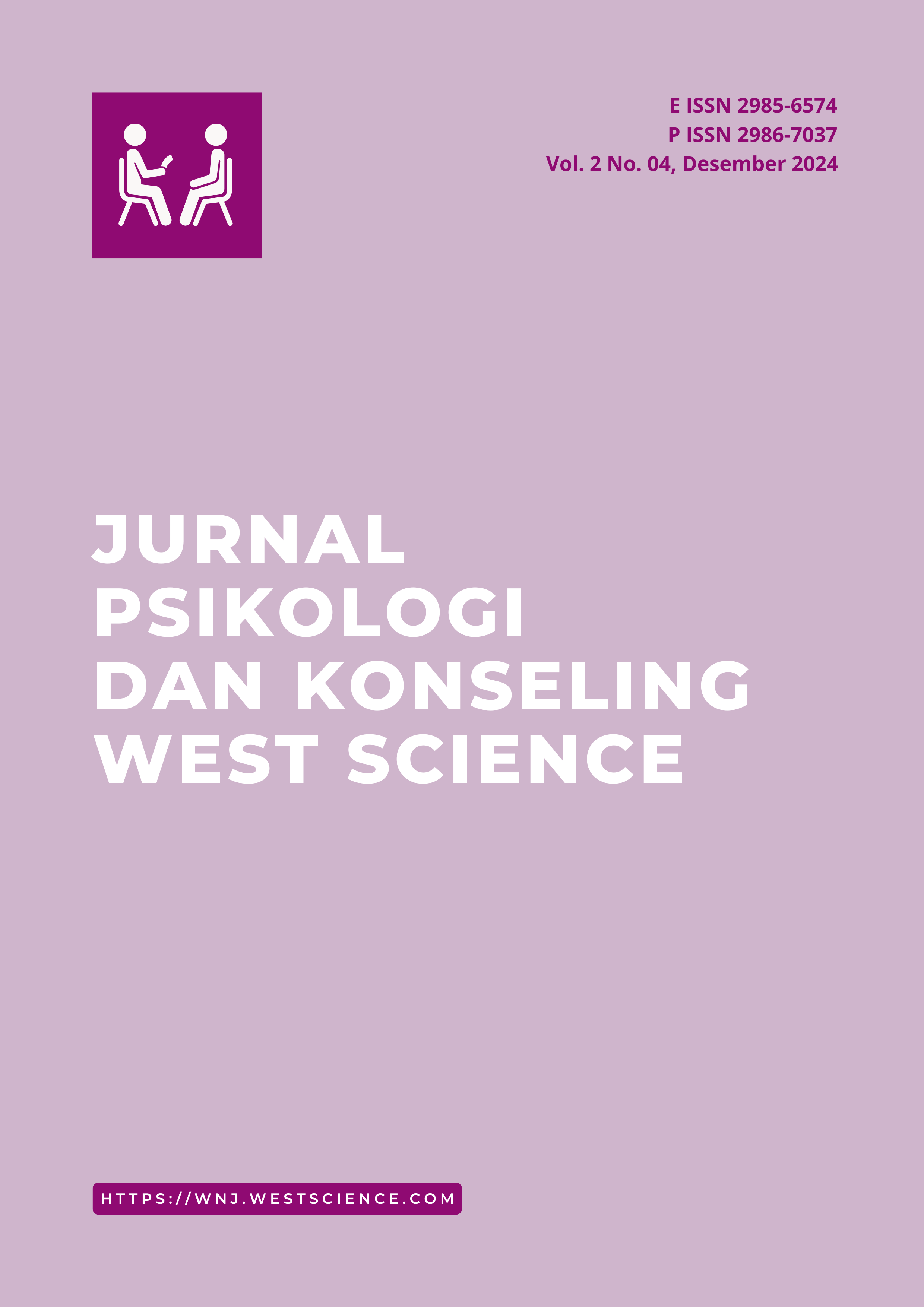Efektivitas Pendekatan Konseling Kognitif-Perilaku dalam Mengurangi Perilaku Bullying di Sekolah
DOI:
https://doi.org/10.58812/jpkws.v2i04.1818Kata Kunci:
cognitive-behavioral counseling, bullying behavior, emotional regulation, empathy, school interventionsAbstrak
Bullying behavior in schools remains a significant challenge, impacting students' well-being, social relationships, and academic success. This study explores the effectiveness of a cognitive-behavioral counseling (CBC) approach in reducing bullying behavior through qualitative analysis involving five informants, including school counselors and students. Data were collected via semi-structured interviews and analyzed using NVIVO software to identify key themes. The findings indicate that CBC effectively reduces bullying behavior by improving emotional regulation, fostering empathy, and enhancing conflict resolution skills. However, practical challenges such as time constraints, limited resources, and stigma surrounding counseling were identified. These findings provide valuable insights for educators and policymakers to develop evidence-based strategies for addressing bullying behavior and promoting a safer school environment.
Referensi
Bandura, A. (1986). Social foundations of thought and action. Englewood Cliffs, NJ, 1986(23–28), 2.
Durlak, J. A., & DuPre, E. P. (2008). Implementation matters: A review of research on the influence of implementation on program outcomes and the factors affecting implementation. American Journal of Community Psychology, 41, 327–350.
Goodwin, D. (2010). Strategi Mengatasi Bullying. Terj. Cicilia Evi, Batu: Lexy Pello.
Habsy, B. A., Malora, P. I., Walidah, Z., & Livi, R. N. (2024). Analisis Efektivitas Teknik Pendekatan Cognitive Behavioral Therapy in the Zone Toxic Relationship. TSAQOFAH, 4(3), 2075–2086.
Habsy, B. A., Putri, R. F., Nursani, R. N., & A’yunin, W. Q. (2024). REVIEW OF THE THEORY AND PRACTICE OF COGNITIVE BEHAVIORISTIC GROUP COUNSELING APPROACHES. Jurnal Kajian Pendidikan Dan Psikologi, 2(1), 12–20.
Harris, S., & Petrie, G. F. (2003). Bullying: The bullies, the victims, the bystanders. Scarecrow Press.
Hikmat, R., Suryani, S., Yosep, I., & Jeharsae, R. (2024a). Empathy’s Crucial Role: Unraveling Impact on Students Bullying Behavior-A Scoping Review. Journal of Multidisciplinary Healthcare, 3483–3495.
Hikmat, R., Suryani, S., Yosep, I., & Jeharsae, R. (2024b). KiVa anti-bullying program: Preventing bullying and reducing Bulling Behavior among students–a scoping review. BMC Public Health, 24(1), 2923.
Kurniawati, M. F., Mariana, M., Pebtianti, E., Riduan, A., & Ridha, M. R. (2024). Fenomena Bullying dan Dampaknya Terhadap Psikologis Remaja Pada SMP Negeri 14 Banjarbaru. Jurnal Informasi Pengabdian Masyarakat, 2(2), 23–30.
Lydecker, J. A., Ozbardakci, E. V, Lou, R., & Grilo, C. M. (2024). Trauma‐Focused Cognitive‐Behavioral Therapy for Adolescents Bullied Because of Weight: A Feasibility Study. International Journal of Eating Disorders, 57(10), 2117–2127.
Mardhiyah, U. A., & Hidayana, A. F. (2024). Developing Children’s Social Empathy as a Means of Preventing Bullying. Child Kingdom: Jurnal Pendidikan Anak Usia Dini, 2(1), 53–61.
Migliaccio, T., Raskauskas, J., & Schmidtlein, M. (2017). Mapping the landscapes of bullying. Learning Environments Research, 20, 365–382.
Mohamed Ahmed Omar, N., Dandash, K., Ahmed Sobhy, S., Mohamed, A., & Elsayed Ameen, A. (2024). Behavioral Modification Theories and Bullying Prevention: A Review Article. Egyptian Reviews for Medical and Health Sciences, 2(2), 1–13.
Priyatna, A. (2013). Lets end bullying. Elex Media Komputindo.
Pudjiastami, A. (2020). Hubungan Perilaku Bullying dengan Kemampuan Interaksi Sosial Pada Siswa Sekolah Dasar Di kota Makassar. Universitas Bosowa.
Rigby, K. (2003). Consequences of bullying in schools. The Canadian Journal of Psychiatry, 48(9), 583–590.
Romadhoni, N. A. (2024). Dampak Bulying Pada Psikologi Anak Usia Dini Dan Progam Pencegahan Pemerintah. Jurnal Riset Sosial Humaniora Dan Pendidikan, 3(1), 40–49.
Saragih, N. A. N. (2024). The Effectiveness of a Rational Emotive Behavior Therapy Group Setting in Reducing Egocentrism in Bullying Perpetrators. Journal of Educational, Health & Community Psychology (JEHCP), 13(3).
Suhaili, S., & Majdi, M. Z. Z. (2024). COUNSELLING COGNITIVE BEHAVIOR THERAPY IN INCREASING SELF-CONTROL WITH INTENSIVE BULLYING BEHAVIOUR. Counsenesia Indonesian Journal Of Guidance and Counseling, 5(1), 20–30.
SUWANDI, N. D., ARDANI, I. G. A. Y. U. I., ADNYANA, I. G. A. N. S., & WINDIANI, I. G. A. Y. U. T. (2024). COGNITIVE BEHAVIOUR THERAPY PADA REMAJA DENGAN PERCOBAAN BUNUH DIRI. HEALTHY: Jurnal Inovasi Riset Ilmu Kesehatan, 3(2), 85–93.
Szczęsna, I. (2024). Consequences of bullying on the life and health of the person being bullied. Kwartalnik Naukowy Fides et Ratio, 59(3), 141–149.
Wakhid, A., Andriani, N. S., & Saparwati, M. (2019). Perilaku Bullying Siswa Usia 10-12 Tahun. Jurnal Keperawatan Jiwa, 5(1), 25–28.
Warni, I. S., Razzaq, A., & Putra, B. J. (2024). APPLICATION OF INDIVIDUAL COUNSELING WITH COGNITIVE DEFUSION TECHNIQUES TO OVERCOME FEELINGS OF INSECURITY IN ADOLESCENT VICTIMS OF BULLYING. Jurnal Konseling Pendidikan Islam, 5(2), 332–341.
Wibowo, A. P. S. (2019). Penerapan hukum pidana dalam penanganan bullying di sekolah. Penerbit Unika Atma Jaya Jakarta.
Yulianti, Y., Pakpahan, I., Angraini, D., Ayunabilla, R., Febia, A. A., & Habibi, M. I. (2024). DAMPAK BULLYING TERHADAP KESEHATAN MENTAL. Jurnal Mahasiswa BK An-Nur: Berbeda, Bermakna, Mulia, 10(1), 153–160.
Unduhan
Diterbitkan
Cara Mengutip
Terbitan
Bagian
Lisensi
Hak Cipta (c) 2024 Sri Musfiroh, Ahmad Shofi Mubarok, Siti Difta Rahmatika, Ayu Lestari, Erik Novianto

Artikel ini berlisensiCreative Commons Attribution-ShareAlike 4.0 International License.



















 Instagram
Instagram 